Pathway Scholars Program
Meet more Pathway Scholars alumni
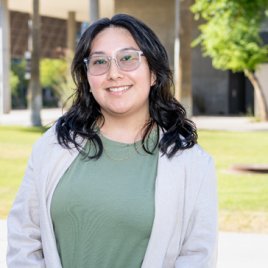
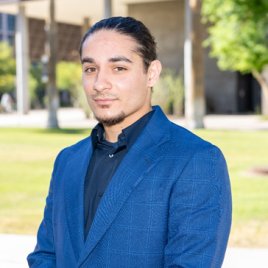
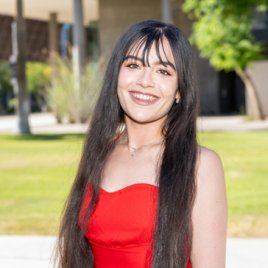
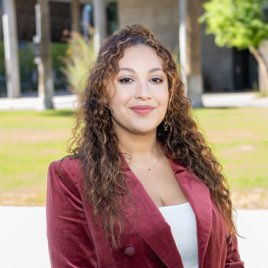
Kathya
Prior to becoming aware of the Pathway Scholars Program’s existence, becoming a physician seemed like a nearly unattainable dream. Throughout my undergraduate years, I would go through the extensive list of prerequisites for admission, and I felt I was nowhere near close enough to becoming a competitive applicant for medical school. As a first-generation Mexican-American, I had to figure out almost everything about navigating higher education on my own. Growing up in a rural border town meant my exposure to clinical experiences was limited, which further increased the uncertainty of pursuing a career in medicine. Given my lack of experience, my anxiety heightened as I discovered that not only would I need research experience to apply to medical school, but I would also be required to do research during medical school. I will admit this revelation left me petrified.
My fears were eased, however, when I was accepted into the Pathway Scholars Program. I found an incredible support system that helped me face my fears and anxieties regarding research. Through the Scholarly Project assignment during my Pathway year, I discovered a newfound passion for research as I centered my investigation on farmworkers from my hometown. I was elated at the possibility that I could directly impact my community through my research.
My passion for pursuing a career in medicine stemmed from the health disparities I witnessed and experienced firsthand with my own family. My great-grandmother went without medical care for years due to the lack of physicians and medical facilities in her rural town in Mexico. This lack of medical care inevitably led to her receiving her cancer diagnosis far too late, and she succumbed to her illness shortly after. This, along with countless similar stories from my community, sparked my interest in medicine and continues to fuel my passion to serve my community as a future physician.
The Pathway Scholars Program was the right fit for me because of its dedication to reaching, supporting, and uplifting students. Through this program, I have had the opportunity to meet amazing mentors and learn from dedicated professors. I was able to get a preview of what my first year of medical school will be like, and I did so feeling reassured because I had the Pathway team’s support and encouragement every step of the way. My Pathway year provided me with the freedom to try different study techniques and resources to find the best fit for me. I was able to join interest groups and even take on leadership roles within them. With my newly gained knowledge and experience, I venture into my first year of medical school with confidence, knowing I can tackle the rigorous curriculum.
Alireza
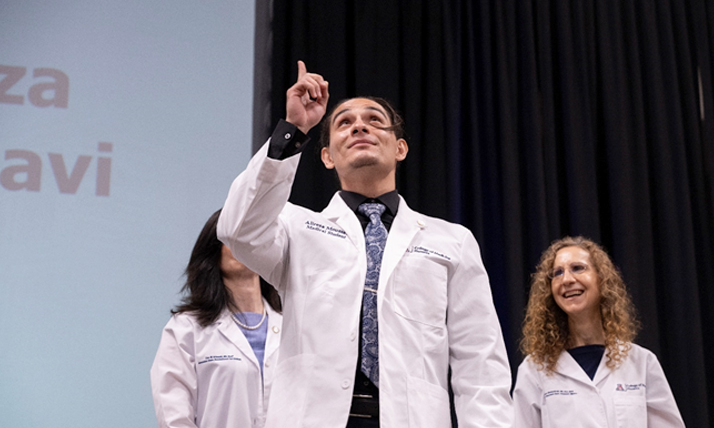
I still vividly recall the moment I discovered the Pathway program. Sitting in a study room on the Arizona State University campus, right across from U of A College of Medicine – Phoenix, I stumbled upon the Pathway Scholars Program's main page. What struck me was its commitment to supporting students—a community I desperately needed. During college, lacking family guidance, I had started to build a network of like-minded peers, also navigating the pre-med path. Together, we shared resources, tackled tough topics, and planned our future steps. These connections taught me the immense power of community in overcoming obstacles and achieving success. When I learned that the Pathway program offered a similar supportive network, complete with dedicated mentors, academic advisors, and tailored learning plans, I was overjoyed. Knowing I would join other students who shared my experiences and challenges made me feel even more confident about my medical journey ahead.
Born and raised in Iran, I moved to the US at the age of 12. My formative years were spent navigating the complexities of both Mediterranean and American cultures, giving me a unique perspective on healthcare disparities. Attending Arizona State University, I earned my bachelor's degree in Medical Studies, all while grappling with my identity as a first-generation student in a new country. My hometown in Iran was marked by significant healthcare challenges, including a general scarcity of essential resources and services. This exposure to healthcare disparities not only shaped my understanding but also propelled me into roles where I could make a direct impact.
As Phoenix became a refuge for many Afghan refugees, I worked as an interpreter and health navigator, guiding them through the intricacies of the healthcare system. I facilitated their access to primary care, ensuring they had the necessary support for transportation and timely attendance at medical appointments, effectively bridging the gap between their needs and available health services. This role deepened my commitment to improving healthcare accessibility for underserved populations.
I was the ideal candidate for the PSP program because I sought a community dedicated to nurturing my potential as a future medical professional. While I had confidence in my capabilities, the program provided a supportive environment that further strengthened my self-assurance through comprehensive academic support and leadership development. Initially, I lacked detailed knowledge of what medical school would require and the variety of skills needed to thrive. Now, thanks to PSP, I have gained invaluable insights into the essentials for medical school success.
Engaging in classes with first-year medical students and participating in additional, specially-paced coursework allowed me to master the material more effectively. This structured educational approach has not only clarified my academic path but also equipped me with the readiness to face the rigorous demands of medical school. Having access to the same resources as medical students enabled me to identify which tools and strategies work best for my unique learning style. The clarity and readiness I have gained through PSP are indispensable assets as I step into medical school, fully prepared and eager to succeed.
Lynnette
The learner and person that I am today are in appreciation of the support I’ve had, the challenges I’ve overcome, and my time in the Pathway Scholars Program (PSP). The process of becoming a physician was always unknown to me as a Mexican-American first-generation student from a border town. I felt like I didn’t have a chance of being accepted to medical school, especially coming from my background. However, in my sophomore year at the University of Arizona, I came across the program through a mentor. I instantly knew this program was for me, and I was going to be able to become the future physician for the underprivileged community I seek to serve.
Through this journey, I've cultivated an understanding of my strengths and weaknesses, harnessing them as assets to propel my academic and personal development forward. This program has been more than just an educational program; it has been a catalyst for self-discovery and empowerment to achieve my goals.
Being raised in San Luis, Arizona, a rural border town, I proudly embrace my identity as a first-generation Mexican-American Latina. In this tight-knit community, where resources are often scarce and health disparities are common, my resolve to serve in the field of medicine was ignited. It was difficult growing up without the medical knowledge to address my family and community’s health needs. My grandmother passed away from breast cancer after a 5-year fight. Understanding the gravity of our family’s situation without health insurance, and with the nearest hospital 45 minutes away, I wanted to find a way to provide a positive impact on my family’s and community’s health to alleviate the health disparities we faced.
In my community, the goal of becoming a physician could only be a dream. Thankfully, I can now tell my community that it can be a reality for each one of us. As a Spanish medical interpreter and medical assistant, I passionately served underserved patients through initiatives like Flying Samaritans and Clinica Amistad. I was also thankful to serve my community as a high school teacher after university, before my transition to PSP, because I wanted to share what I learned with students who had a background similar to mine. I made sure to remind them that although they come from a rural community and a Title 1 school, they can complete any goal they set out to accomplish, and I’ll always be there to cheer them on and mentor them along the way.
These experiences solidified my commitment to addressing healthcare inequities and fueled my aspiration to become a healer and advocate for those in need. Now, equipped with a wealth of knowledge from sharing similar classes and curriculum with first-year medical students, I feel confident to take on medical school.
I am grateful to have had a year of invaluable mentorship from my professors and physicians, which has made me a better-prepared learner. I was able to understand the type of learner I am with a curriculum similar to that of medical school, which was truly helpful in learning early on how to study effectively and efficiently. Having great peer learning mentors was also incredibly helpful, as they supported us through any difficult concepts.
As I embark on the next chapter of my journey, I carry with me the dedication of leadership, committed to uplifting and supporting future students. Grateful for the connections I’ve made and the wisdom I’ve gained along the way, I am committed to providing a positive impact on the medical community and beyond.
Arianna
My pathway to medical school was never as straightforward as I wanted it to be. Though I was not the first in my family to attend college, I was the first to decide to become a physician, which meant that I had to teach myself all of the nuances of the incredibly daunting task of applying to medical school. There were certainly many bumps along the road that I had to navigate alone and, though my loved ones tried their best to support me, they did not fully understand the struggle it is to be accepted to medical school. When I was accepted to the Pathway Scholars Program, it was the first time that I felt that I was not alone in my journey—instead, I had a group of peers who completely understood where I was coming from and what I had gone through because they had similar backgrounds.
In my undergraduate career, I never had a mentor to support me through my education, but with PSP, I know that my cohort will be there to help guide me every step of the way, as I will for them. This program is more than just a gateway to getting into medical school; it is a second family that I never thought I would have and the best support system I ever could have wished for.
My journey on the path to becoming a physician was cemented while I lay in an ICU bed for four days after being diagnosed with a chronic autoimmune disease and nearly dying of related complications. Months of nausea and exhaustion in my sophomore year at the University of California, San Diego culminated in an emergency trip to the hospital, a diagnosis of type 1 diabetes, and the life-threatening condition of diabetic ketoacidosis.
My diagnosis inspired me to connect with others living with diabetes, particularly those less fortunate than I, which is how I found the non-profit American Youth Understanding Diabetes Abroad (AYUDA). With AYUDA, I traveled to the Dominican Republic (DR), where we partnered with a local diabetes foundation to help empower children and adults with diabetes through sustainable diabetes education. After five years in this position, I was drawn to use my experience educating and empowering people with chronic illnesses to support other underserved populations by providing direct care as a physician. Diabetes is a disease that I may have to contend with for the rest of my life, but I am not resentful; rather, I am grateful for the path to which it led me.
I knew coming into the Pathway Scholars Program that I wanted to be a physician to help give a voice to populations that often are overlooked or feel that they will not be heard by medical professionals. Participating in PSP deepened my commitment to underserved areas by giving me the opportunity to interact with patients from these communities and hear their stories. These interactions deepened my understanding of the needs of these patients and helped me see how I can fit in and become the physician that they need.
Furthermore, PSP gave me the opportunity to grow as a person and future physician. With each lecture or Doctoring session, I felt like I unlocked a new part of myself that had been waiting to be expressed; I came into who I am meant to be. I will forever be grateful to this program for this and for everything it taught me.